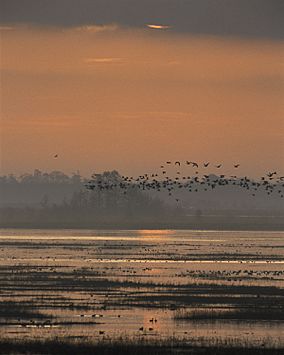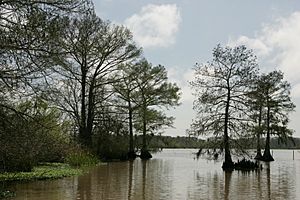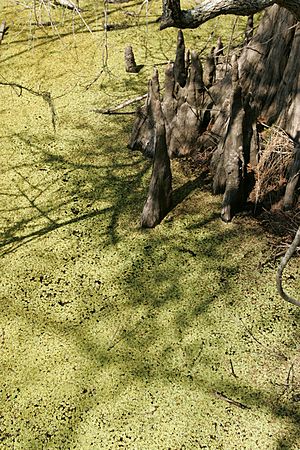Lacassine National Wildlife Refuge facts for kids
Quick facts for kids Lacassine National Wildlife Refuge |
|
|---|---|
|
IUCN Category IV (Habitat/Species Management Area)
|
|

Sunset on the marsh at Lacassine National Wildlife Refuge
|
|
| Location | Cameron and Evangeline parishes, Louisiana |
| Nearest city | Lake Arthur, Louisiana |
| Area | 35,000 acres (140 km2) |
| Established | 1937 |
| Governing body | U.S. Fish and Wildlife Service |
| Website | Lacassine National Wildlife Refuge |
Lacassine National Wildlife Refuge is a special place in southwestern Louisiana. It covers parts of Cameron and Evangeline parishes. This refuge was created in 1937 to be a safe home for migratory birds and other wildlife.
The refuge is very large, almost 35,000 acres (140 km2) in size. A part of it, called Duralde Prairie, is still being developed. It is located north of the city of Eunice.
Contents
Part of a Bigger Refuge Family
Lacassine National Wildlife Refuge is part of a bigger group called the Southwest Louisiana National Wildlife Refuge Complex. This complex was formed in 2004. It includes other important refuges like Cameron Prairie National Wildlife Refuge, East Cove National Wildlife Refuge, Sabine National Wildlife Refuge, and Shell Keys National Wildlife Refuge.
History of Lacassine Refuge
The refuge was created from 13,000 acres (5,300 ha) of land bought from The Lacassane Company. This land used to be part of two large farms. In 1976, the United States Congress set aside 3,345.6 acres (1,353.9 ha) of the southern part of the refuge. This special area is called the Lacassine Wilderness. It is kept as wild as possible to protect nature.
Amazing Wildlife and Habitats

The refuge has many different types of plants. You can find water-loving grasses, sedges, and shrubs. In the wild marsh areas, plants like bulltongue and maidencane are common.
The refuge has different kinds of natural areas:
- 16,500 acres (67 km2) of natural, freshwater marsh and open water.
- 16,000 acres (65 km2) of managed freshwater marsh, known as Lacassine Pool.
- 2,200 acres (8.9 km2) of fields where rice, wheat, and soybeans are grown.
- 350 acres (1.4 km2) of flooded gum and cypress trees.
- 350 acres (1.4 km2) of restored tallgrass prairie.
Many animals that live in Louisiana's coastal marshes can be found here. You might see large groups of ibis, roseate spoonbills, and egrets nesting. Alligators are also common. Furry animals like mink, otter, raccoon, and nutria live here too.
Some rare and protected animals have used the refuge. These include bald eagles, peregrine falcons, and the Louisiana black bear.
Hundreds of thousands of ducks and geese visit the refuge in winter. Other ducks, like wood ducks and whistling ducks, nest here.
The refuge is famous for attracting many pintail ducks in winter. In the past, over 300,000 pintails would visit! However, their numbers have gone down over the years.
How the Refuge is Managed

Lacassine National Wildlife Refuge is carefully managed. The goal is to help waterfowl (like ducks and geese) and other wetland animals.
One way they manage the refuge is by controlling water levels. This helps natural marsh plants grow. They also plant crops like rice to provide food for birds that spend the winter here.
The refuge also works to bring back coastal prairie areas. They use controlled fires every 3-5 years. This helps new grasses grow and keeps the marsh healthy.
The refuge has a special program for its 3,445-acre (13.94 km2) wilderness area. They also manage the American alligator population through a trapping program. Volunteers and interns help with many of these important tasks.
Fun Things to Do at the Refuge
Lacassine National Wildlife Refuge offers many fun activities for visitors.
- Hunting and fishing are very popular.
- Bird watching is also a favorite activity. You can get a list of birds that live here.
- There is a nature drive where you can see animals from your car.
- You can explore foot trails and climb observation towers. These are open all year.
- Students can even earn college credits by working as interns at the refuge.
Images for kids
 | James B. Knighten |
 | Azellia White |
 | Willa Brown |





